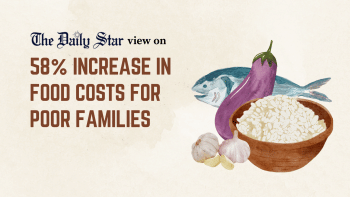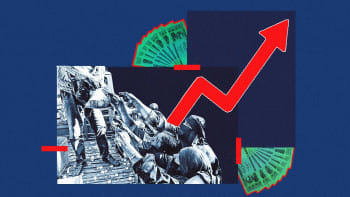Why the consumer protection law needs to change

In today's consumer-driven economy, the notion that "consumers reign supreme" often masks the reality that they frequently bear the brunt of market manipulation, silently suffering at the hands of powerful market forces. In Bangladesh, the escalation in prices of basic necessities has diminished the buying power of those with fixed or lower incomes, simultaneously inflating the cost of living. Additionally, the price surge has pushed a segment of the population below the poverty threshold. When addressing the artificial inflation of prices in Bangladesh, the term "syndication" immediately springs to mind.
This term is widely recognised and often debated within the Bangladeshi context. It holds particular significance in the country's market dynamics. Notably, ordinary Bangladeshi consumers find themselves adversely affected by such practices, unfortunately regarding them as an integral part of their everyday lives. Policymakers frequently point fingers at a subset of traders for allegedly forming syndicates that have thus far evaded legal repercussions. While the existence of these syndicates requires investigation by the appropriate authorities, the reality remains that consumers are bearing the brunt of exorbitant prices for daily essentials.
Prior to 2009, Bangladesh lacked legislation directly addressing consumer concerns. With the enactment of the Consumer Rights Protection Act (CRPA), 2009, there was optimism among consumers initially. However, it has since become evident that this law falls short in addressing crucial aspects of consumer rights. Despite clear legal deficiencies, there have been no amendments made to the CRPA since its enactment. Now, 15 years later, policymakers have yet to take significant action to address these issues, which hinder the effective implementation of consumer rights in Bangladesh. Therefore, the law needs to be revised.
The definition of "consumer" in the CRPA is detailed but not comprehensive. For example, it doesn't specifically address e-commerce consumers. It isn't precise enough to encompass account holders for e-commerce transaction platforms like bKash, Nagad, Rocket, Upai, Foodpanda, Pathao, Uber, and others. Additionally, the CRPA's definition of "service" overlooks e-commerce services like ATMs, online banking, online shopping, online ticket purchases, and similar activities. Consequently, consumers engaging in e-commerce don't receive the same level of protection as those in other areas. The definition of "complaint" too is limited for Bangladeshi consumers. Section 2(2) of the Act defines "complaint" as a written claim submitted to the Director General by a complainant against a seller for engaging in anti-consumer behaviour as described in the Act. This restrictive definition creates a legal obstacle for consumers seeking direct access to justice.
Artificial inflation of prices is a crucial element contributing to the infringement of consumer rights in Bangladesh. The CRPA contains no clause addressing artificial price increases. Chapter 4 of the CRPA deals with the penalties for offences identified within the Act. According to sections 37 to 54, the minimum term for imprisonment sentences is one year and maximum three years, while fines are a minimum of Tk 50,000 and a maximum of Tk 2 lakh. However, these penalties are considered inadequate for offences like producing counterfeit goods, selling expired products or medications, adding prohibited substances to food items, or any other action that endangers life. Such violations can lead to fatalities, but the Act lacks specific punishment for cases where these offences result in someone's death. The range of penalties should be expanded to address these concerns. Although the Act imposes penalties for filing false or frivolous cases, it does not cover punishment for aiding or inciting such cases or committing the offences described in this Act.
Section 59 indicates that offences under this Act are bailable, cognisable, and compoundable. However, while this section mentions the possibility of compounding offences, it does not provide a clear mechanism for how compounding should work. There are no detailed guidelines for compounding offences. Section 73 of the CRPA imposes two kinds of legal limitations. First, the Director General is unable to initiate legal proceedings even after identifying deficiencies in private healthcare services. Second, this section does not address public healthcare services at all. Regardless of whether it is private or public, health safety should be given top priority.
The Act falls short in establishing an effective grievance redress mechanism. As mentioned earlier, under this Act, only designated government officials have the authority to file cases against violations of any of its provisions. Another limitation of the CRPA is that it assigns a supervisory role to the Directorate of National Consumer Rights Protection. It stipulates that the directorate will oversee the anti-consumer rights practices outlined in the Act, but it does not specify any guidelines on how this supervision should be carried out. Furthermore, the Act does not incorporate the fundamental concept of the product liability principle, a recognised standard in international law when it comes to consumer protection. As a result, consumers in Bangladesh are at a significant disadvantage in safeguarding their rights compared to those in developed countries. In this context, policymakers in Bangladesh could look to the Indian Consumer Protection Act, 2019, for guidance. This Act includes comprehensive provisions on consumer dispute redressal commission, mediation, and product liability.
The CRPA, despite its initial promise, has proven to be inadequate in providing comprehensive protection to consumers. Its deficiencies span across several critical areas, including the scope of consumer definitions, the lack of provisions addressing e-commerce, insufficient penalties for severe offences, and a weak mechanism for addressing grievances. The law's narrow definitions and failure to recognise strict liability in product-related issues contribute to an environment where consumer rights are not fully protected, and enforcement is lacking. Additionally, artificial price inflation due to "syndication" exacerbates the already challenging situation for ordinary consumers, impacting their purchasing power and overall quality of life. Consequently, the Ministry of Law, Justice and Parliamentary Affairs should take the required steps to amend the CRPA, 2009.
Md Ala Uddin teaches Business Law at Cox's Bazar International University.
Views expressed in the article are the author's own.
Follow The Daily Star Opinion on Facebook for the latest opinions, commentaries and analyses by experts and professionals. To contribute your article or letter to The Daily Star Opinion, see our guidelines for submission.

 For all latest news, follow The Daily Star's Google News channel.
For all latest news, follow The Daily Star's Google News channel. 









Comments